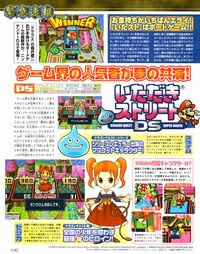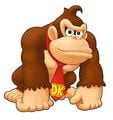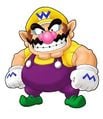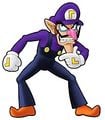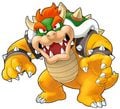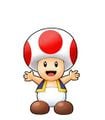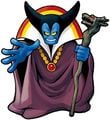Itadaki Street DS: Difference between revisions
m (Text replacement - "{{NIWA\|DragonQuest=[^\|}\n]+}} " to "") |
mNo edit summary |
||
| Line 19: | Line 19: | ||
'''''Itadaki Street DS''''' (いただきストリートDS, lit. "Top Street DS") is a game for the [[Nintendo DS]]. It was created by [[Square Enix]]. Like other installments in the ''Itadaki Street'' series, ''Itadaki Street DS'' is a ''{{wp|Monopoly (game)|Monopoly}}''-like game that has some ''[[Mario Party (series)|Mario Party]]''-esque elements added to it due to the appearance of several ''Mario'' characters ([[minigame]]s, for example). It was released on June 21, 2007 only in Japan. | '''''Itadaki Street DS''''' (いただきストリートDS, lit. "Top Street DS") is a game for the [[Nintendo DS]]. It was created by [[Square Enix]]. Like other installments in the ''Itadaki Street'' series, ''Itadaki Street DS'' is a ''{{wp|Monopoly (game)|Monopoly}}''-like game that has some ''[[Mario Party (series)|Mario Party]]''-esque elements added to it due to the appearance of several ''Mario'' characters ([[minigame]]s, for example). It was released on June 21, 2007 only in Japan. | ||
A follow-up to this game, titled ''[[Fortune Street]]'' was released for the [[Wii]] in December 2011. | A follow-up to this game, titled ''[[Fortune Street]]'', was released for the [[Wii]] in December 2011. | ||
==Gameplay== | ==Gameplay== | ||
Players move around the board, buying shops and collecting money from others who land on their shop spaces. Depending on circumstances, some players can forcibly take over another player's shop spaces, or make them inactive for a turn. Players can also hold shares of a block of spaces so that they get paid when someone lands on any space in that block, even if it is not their own. | Players move around the board, buying shops and collecting money from others who land on their shop spaces. Depending on circumstances, some players can forcibly take over another player's shop spaces, or make them inactive for a turn. Players can also hold shares of a block of spaces so that they get paid when someone lands on any space in that block, even if it is not their own. | ||
Revision as of 13:35, February 15, 2023
The title of this article is from the English Super Mario Bros. Encyclopedia, which reportedly sourced some names from fan wikis.
If a higher-priority source is found, then the article should be moved to the new title.
It has been requested that this article be rewritten and expanded to include more information.
| Itadaki Street DS | |||
|---|---|---|---|
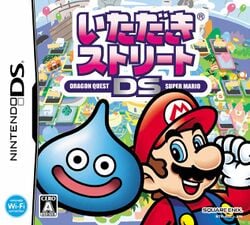
| |||
| Developer | Armor Project | ||
| Publisher | Square Enix | ||
| Platform(s) | Nintendo DS | ||
| Release date | Template:Release[?] | ||
| Genre | Board Game | ||
| Rating(s) |
| ||
| Mode(s) | Single-player, 1-4 Multiplayer | ||
| Input | Nintendo DS:
| ||
Itadaki Street DS (いただきストリートDS, lit. "Top Street DS") is a game for the Nintendo DS. It was created by Square Enix. Like other installments in the Itadaki Street series, Itadaki Street DS is a Monopoly-like game that has some Mario Party-esque elements added to it due to the appearance of several Mario characters (minigames, for example). It was released on June 21, 2007 only in Japan.
A follow-up to this game, titled Fortune Street, was released for the Wii in December 2011.
Gameplay
Players move around the board, buying shops and collecting money from others who land on their shop spaces. Depending on circumstances, some players can forcibly take over another player's shop spaces, or make them inactive for a turn. Players can also hold shares of a block of spaces so that they get paid when someone lands on any space in that block, even if it is not their own.
Players get bonuses for leveling up, which is done by passing four special spaces on the board (each marked with a suit- Club, Diamond, Heart, and Spade) and then going to the Bank space. If the player lands on one of these special spaces instead of passing them, they get a chance to randomly draw a "chance card", which affects gameplay or a player. Usually, the goal is to reach a certain total property value and get to the Bank, or to make a player bankrupt. There is also a special "Casino" space where themed games of chance occur.
Squares
- Shop: The player can use his money to buy it. If this shop is owned by somebody else, the player must pay its price. If this shop is already owned by the one that lands on it, he can invest money in one of his shops.
- Boon Square: The player gets a quarter of all the fees for one turn.
- Boom Square: The player gets the half of all the fees for one turn.
- Vacant Plot: The player can build anything on it.
- Casino: The player can play a minigame and win some money, stocks or suits.
- Break Square: All the player's shops get closed for a turn.
- Suit Square: The player gets a suit and chooses a chance card if he lands on it.
- Chance Square: The player chooses a chance card.
- Cannon Square: The player goes to the chosen opponent's location.
- Warp Square (Either a Warp Pipe or a Portal): The player warps to the Warp Square of the same color.
- Switch Square: The Board's shape changes.
- Magmalicious Square: If the Square is active, the player goes to an inactive Magmalicious Square and then it becomes inactive. It only appears in the Death Volcano.
- Suit Change Square: The suit offered by the square is not fixed; it changes as players pass by it.
- Die Square: The player rolls another die.
- Bank Square: All players start and end in this square. When a player passes by this square, they may buy stocks. If the player bring the four suits to the Bank, they get a Salary and their level increases by one. When they have the goal assets, they have to go to the bank in order to win.
- Broker Square: The player may buy stocks.
Areas and stock system
It has been requested that this article be rewritten. Reason: the section, especially on stocks, is unclear to users who have not played the game and possibly includes player strategies, which are not allowed in articles
All shops are divided in many areas or blocks, each one which a name and a color. Most areas contain four shops. Shops start with a given price when players buy them, and they may invest on it later when they land on it to raise its price and value. If players get another shop in the same area as other owned shops, the shops' prices grow, and the player can invest more money on that shop. The player can achieve a monopoly by owning all shops in the area. Shops in monopolized areas accept even bigger invests that can be used increase stock price to benefit the player.
A player in the bank or a broker square may buy stocks. The player can choose any block; if the player has an area with shops to invest in, the player will mostly invest on that area to get money from the invests, and if the player owns no area but an opponent owns one, the player may buy stocks on that area to receive money when the opponent invests. Also, if the player has stocks in the same area a player in first place, the player may sell 10 stocks in each turn to lower the assets. This is an offensive technique performed by Rank S CPU characters. When a player buys or sells more than 10 stocks in an area, the price of stock in that area will go up or down by 8% respectively. Players may buy as a max amount 99 stocks per bank/broker pass (which is the recommended amount, and all Rank B, A and S players will buy MAX stocks and invest MAX capital in their shops) and can hold a max amount of 999 stocks in an area. Also, players may invest only the specific MAX amount in a shop when they land on it. If this amount is 1000G or more, the player may invest only 999G per land.
Players may also force buyout on the opponents' shops when they land on them. To buy a shop out, the player must pay 5x its real value. Buyouts are often made in late game to monopolize areas or to get rid of the opponents' monopolized areas by buying out the cheapest property. To prevent buyouts, players may invest on their small shops to make them more expensive. The shop design and material changes depending on the price.
Each AI will invest differently:
| CPU Rank | Max. stock buying per bank pass | Max. investment per invest | Chance of buyout for others | Other notes |
|---|---|---|---|---|
| Rank D | 29 | 100G | Very rarely | none |
| Rank C | 49 | 200G | ? | none |
| Rank B | Maximum | Maximum | Often | Usually invests too early |
| Rank A | Maximum | Maximum | Often | Invests later than Rank B CPUs |
| Rank S | Maximum | Maximum | Often | Sometimes sells stock to lower opponents' assets |
Rank D AI limit themselves to buy 29 stocks per bank pass and 100G per invest, and they very rarely force a buyout. Rank C AI limit themselves to buy 49 stocks per bank pass and 200G per invest. Rank B AI invest the max amount of stocks per bank pass and invest the max amount of money in their shops, but they invest so early and even when they have a few amount of stocks that the raised price may end being too expensive for them, so they cannot get more stocks. Rank A also invest the max amount but they don't invest when they have few stocks, they wait until they get a good amount of stocks and then they invest and get a big amount of money. They also try to buy stocks on the opponents' areas to get extra money. Rank S also invest that way, but they sell stocks in purpose in opponents' areas to lower their assets. Rank B, A and S often buyout to get three shops or monopoly in an area or to prevent an opponent from investing in a monopolized area.
Vacant Plots
There are special spaces with a "Sale" sign on them. In those spaces, the player can build one of the following:
- Gate: It starts with a price of 10G, and when somebody passes by it, that player has to pay the price of the Gate and it increases by 10G. Platypunk, Slime, Birdo, Donkey Kong, Dragonlord and Bowser often build it.
- Circus Tent: The tent price starts being 100G, and if the owner lands on it he may increase it to 500G, 1000G, and finally, 2000G. The player has to pay 100G for each investment and the Circus Tent's value also increases by 100G. Luigi, Daisy, Toad and Yangus often build it.
- Balloon Landing: The owner can fly anywhere when he lands on it. Other players have to pay 10% of the owner's salary. Mario, Bianca, Alena, Peach and Yoshi often build it.
- Shrine: The owner can get a 5% bonus on all his assets if he lands on it. Other players have to pay 10% of all their assets, making it one of the most expensive buildings. But it can be easily bought out with 1000G, which is a small amount of money in the late stages of the game. Pudding, Kiryl, Jessica and Angelo often build it.
- Bar: The owner can invite everybody to a party in the bar, which means that everybody must warp to the Bar space. If other players land on it, they must give the owner a "gift" of 30GxLVL. Wario, Waluigi and Hassan often build it.
- Real Estate Agency: The owner can buy any ownerless shop. If other players land on it, they must "sleep" and their shops close for a turn. It is the least used building in all the game and the AI buys it very rarely.
- Wood Shop: It acts like a normal shop. But since it is worth 1000G, when it is built, the stock price of the area where it was built rises highly. A good strategy with those buildings for the player is to get more than 99 Stocks in an area where they have any building and then turn it into a Wood Shop to raise their asset value. They must have at least 850G in money, because the strategy could fail if they are prompted to sell stocks and then they have to sell most of the area's stocks and then win very little money. B, A and S-Ranked characters may use this strategy.
All vacant plots are worth 200G, and the Wood Shop is worth 1000G. Players can renovate a vacant plot whenever they want, and they get 150G for the destruction of the former building, which means that they only have to pay 50G for a normal building and 850G for a Wood Shop. Players will get 750G for the destruction of a Wood Shop. As shown before, what the AI builds in a Vacant Plot depends in the character.
Characters
There are 23 playable characters in Itadaki Street DS (if the male and female avatars are counted as one character): Eleven from the Mario series and eleven from the Dragon Quest series. Players are also able to create and customize their own characters that can be played as. Although only four of the characters from both series are playable to begin with, the others can be unlocked by playing through the Tour Mode of the game. Additionally, there are also three Support/Guest characters that players can summon with the help of a card, but are not playable.
Mario series
Mario (Rank A)
Luigi* (Rank C)
Yoshi (Rank B)
Princess Peach (Rank S)
Donkey Kong* (Rank D)
Wario* (Rank B)
Princess Daisy* (Rank C)
Waluigi* (Rank C)
Birdo* (Rank D)
Bowser* (Rank A)
Toad (Rank C)
Dragon Quest series
- Slime Itadaki Street DS artwork.jpg
Slime (Rank D)
Angelo* (Rank A)
Jessica* (Rank S)
Pudding (Rank C)
Bianca* (Rank B)
Dragonlord* (Rank S)
Alena* (Rank B)
Kiryl (Rank C)
Yangus (Rank D)
Carver* (Rank C)
Platypunk* (Rank C)
Other
* - Unlockable characters.
Support/Guest Characters
- Lakitu (shuts down spaces he passes or lands on for one turn)
- Healslime (gives marks necessary for leveling up when player passes it)
- Dancing Jewels (pays out to the owner of any space it lands on)
Stages
There are 14 playable stages in this game.
Mario Stages
Dragon Quest Stages
Minigames
When a player lands on the Casino square (Which was renamed to Arcade square in Fortune Street), that player gets to play a game of chance. There are four of them:
- Itadaki Slot: The Player rolls a slot to get some prizes. The player must make rows of pictures to win. Three Slimes/Goombas are worth 100GxLVL, two Slimes/Goombas are worth 30GxLVL, one Slime/Goomba is worth 10GxLVL, three Wild Cards are worth one Wild Card, three Warp Pipes/Chimera Wings let the player warp to any square and three Stocks (株) give the player five Stocks x LVL in the most valuable area.
- Amida Pipe: This game takes place in the Warp Zone from Super Mario Bros. The player must choose one of the three pipes and the pipe will either lead to coins (10GxLVL each one), a ? Block that may have coins, a mushroom that lets one of the player's shops grow, a Wild Card or a Poison Mushroom that makes the player sleep for one turn. One of the pipes leads to a Piranha Plant. If the player chooses that one, Mario loses a life and the player gets no reward.
- Silver Tarot: The player is given some concealed Tarot cards, and they must choose two. The first card decides which players are gonna get something (The one in last place, everyone except the player, etc), and the second card decides the event. The events usually reward the player(s) with money or the effect of a boon square, except for the Grim Reaper card, that makes the player(s) sleep and plays the same fanfare that is heard when somebody gets chance card #13.
- Monster Colosseum: A list of five Dragon Quest monsters appear, and the players must choose one of them. After the monsters are chosen, they will fight and the owner of the last monster alive wins some Gold.
Chance Card list (translation)
- You may change direction!
- B-Dash! Roll again!
- Warp to any space except a chance space!
- You must give 100g to a rival of your choice!
- Warp to a Lot of your choice!
- Warp to a Chance Space of your choice!
- The value of all your lots increases by 7%!
- Rent on all owned lots is increased by 30% until the owner's next turn! Roll again!
- All shops close until the owner's next turn! Roll again!
- Rent on all owned lots is decreased by 50% until the owner's next turn! Roll again!
- Steals gold equal to 11 times the result of the dice roll from all your rivals!
- You may invest one of your lots!
- The value of all your lots decreases by 13%!
- You must give all rivals 30g!
- You will receive gold equal to 50 times the result of the dice roll!
- A roulette is spun three times, whichever streets the wheel stops on will have its lots increase by 10%!
- You get half your level up bonus! (The current character level)
- You must sell a house back to the bank, but you get twice its value!
- Rent of your lots is increased by 30% until your next turn!
- Increases the Worth of any owned lot of your choice by 20%!
- A roulette is spun, you get 20 shares in whichever street the wheel stops on!
- You may sell a Space back to the bank for twice its value!
- Increases the Worth of any owned lot of your choice by 50%!
- You must sell a house back to the bank, but you get 200g + its value!
- Rent of all your lots is halved until your next turn!
- You will receive a share of any rent paid until your next turn! (same as the Lucky Star space)
- You will receive 27 gold for every space you own!
- Summons Dancing Jewels!
- You must warp to a rival of your choice!
- Rent on all owned lots is set to 100g until the owner's next turn! Roll again!
- A roulette is spun, whichever street the wheel stops on will have its lots increased by 10%!
- A roulette is spun, whichever street the wheel stops on will have its lots increased by 20%!
- You may sell a Space back to the bank for triple its value!
- Sweetbreathed! All your lots will close for one turn!
- You may sell any number of shares owned in one block back to the bank for 35% more!
- You may pay 100g to invest in one of your lots!
- A roulette is spun, whichever street the wheel stops on will have its lots increased by 30%!
- You may buy stock... but it will cost 10% more!
- You must give 50g to a rival of your choice!
- A roulette is spun, whichever street the wheel stops on will have its lots decreased by 20%!
- A roulette is spun, whichever street the wheel stops on will have its stock decrease by 10%!
- A roulette is spun, whichever street the wheel stops on will have its stock decrease by 20%!
- Capital Tax! You must pay two gold for every share owned!
- Explodet is casted! All lots next to you decrease by 20%!
- You must pay 20 gold for every space you own!
- Speeding Fee! You must pay 150 gold!
- Randomly decreases lots valued between 50g-100g to 49g! Sometimes increases random lots below 49g to 50g!
- A roulette is spun, whichever street the wheel stops on will have its lots decreased by 10%!
- A roulette is spun, whichever street the wheel stops on will have its lots decreased by 20%!
- Move again with the same number you rolled!
- Move one space!
- Move two spaces!
- You must warp to bank!
- You may pay 100g to warp to bank!
- Roll again! You don't pay rent to any rivals this roll!
- Roll again! You pay rent to any rivals this roll at half price!
- Warp to any space of your choice!
- You may pay 100g to warp to anywhere except a chance space!
- Buy any stock with a 10% discount!
- A roulette is spun, whichever street the wheel stops on will have its stock increased by 10%!
- Receive Gold equal to 10% of the sum of all owned stock!
- Receive Gold equal to 20% of the sum of all owned stock!
- A roulette is spun, whichever street the wheel stops on will have its stock increased by 20%!
- A roulette is spun, whichever street the wheel stops on will have its stock increased by 30%!
- Buy any lot of your choice for five times its value!
- You receive 10 shares in the most expensive stock!
- Buy any stock of your choice!
- Super High Tension! Rent of all your lots is doubled!
- You may sell any number of shares owned in one block back to the bank for 20% more!
- Levels you up and gives you the bonus! (You forfeit any collected suits)
- Gain gold!(proportional to current character level)
- You receive 20 gold for every lot you own!
- You may buy any empty lot of your choice!
- You must auction one of your lots to your rivals; However, the lot opens at twice its value! If no one bids, the bank buys it at the opening price!
- You may buy any empty lot of your choice! However, it will cost twice as much.
- You receive 500g!
- You receive five shares on each street!
- You may buy any empty lot of your choice! However, it will cost 200g more.
- Buy any lot of your choice for three times its value!
- Sets all lots with rent between 1g-49g to 50g!
- Makes all rivals roll a one on the next dice roll!
- A LUKSeed is found! All lots next to you increase by 10%!
- Randomly relocates rivals!
- Blazemost is casted! A random lot's rent below 300g is reduced to 1g! If there are none, it halves the rent of a lot instead!
- You will receive gold equal to 100 times the result of the dice roll!
- Steal 100g from all your rivals!
- You receive 50g!
- Your rivals rotate places with each other!
- Everyone gets a wild card!
- All players' rent are increased by 30% until their next turn!
- Summons Healslime!
- Summons Lakitu!
- Hazzle Dance! The Bank invests 10G in all your shops!
- Get gold to equal 20% of total house values!
- Warps everyone to you!
- Warps everyone to a player other than you!
- Increase the Stock of a street of your choice by 20%!
- Buy any lot of your choice for four times its value!
- Gives you all four suits!(Will be given a wild card if 4 suits are already attained)
- You receive a wild card!
Unlockable Accessories
Mario series
Headgear
- Mario's Hat
- Luigi's Hat
- Peach Hair
- Daisy Hair
- Yoshi Cap
- Birdo Head
- Toad Head
- DK Head
- Wario's Hat
- Waluigi's Hat
- Bowser Cap
- Dr. Mario Hair
- Peach Sport Hair
- Tailed Mario's Hat
- Hammer Bros. Head
- Shy Guy Mask
- Piranha Plant
- Cannon Head
- Thwomp Head
Body
- Mario's Clothing
- Luigi's Clothing
- Peach's Dress
- Daisy's Dress
- Yoshi Suit
- Birdo Suit
- Toad Suit
- DK Suit
- Wario's Clothings
- Waluigi's Clothings
- Bowser Suit
- Dr. Mario's White Shirt
- Peach's Sport Clothes
- Daisy's Sport Clothes
- Koopa Troopa Suit
- Shy Guy's Clothings
- Tube Suit
- Bullet Bill Suit
- Mario's Soccer Clothes
Hand
- Fireball
- Hammer
- Peach's Parasol
- Fire Flower
- Mushroom
- P Switch
- Toadsworth Wooden Staff
- Barrel
- Bat
- Bob-omb
- Magikoopa's Staff
- Capsule
- Tennis Racket
- Driver
- Shine
- Star
- Banana
- 1UP Mushroom
- DS Lite
- Wii Remote
Other
- Mario's Mustache
- Luigi's Mustache
- Poltergust 4000
- Triple Shell
- Yoshi Egg
- Flower
- Chain Chomp
- Triple Banana
- Wario's Mustache
- Waluigi's Mustache
- Bowser Jr.'s Bandana
- Virus
- MicroGoomba
- Tailed Mario's Tail
- Pump
- Koopa Troopa
- Buzzy Beetle
- Goomba
- Boo
- Soccer Ball
Gallery
- For this subject's image gallery, see Gallery:Itadaki Street DS.
- Slime Itadaki Street DS artwork.jpg
- Itadaki Sutorito logo.jpg
Japanese logo
References to other games
- Super Mario RPG: Legend of the Seven Stars: The theme "Hello, Happy Kingdom" is featured in this game's tutorial level.
Names in other languages
| Language | Name | Meaning | Notes |
|---|
